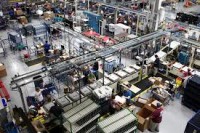 Industrial production and manufacturing saw their highest falls since 2009.
Industrial production and manufacturing saw their highest falls since 2009.
Bloomberg reported that German industrial production fell by “more than economists forecast” in August, the biggest drop since 2009, noting that this was “the latest sign that the outlook for Europe’s largest economy is deteriorating”.
Production fell four percent from July, where it had grown by 1.6 percent, and Bloomberg stated the German economy is “losing momentum” due to confidence issues surrounding “sluggish growth in the euro area” and “political tension with Russia”. Weak data relating to the economy has reportedly “raised the spectre of recession” in the country, adding to a fall in factory orders of 5.7 percent in August and a fall in manufacturing, with orders “falling at the fastest pace since 2012”.
Output of investment goods fell by 8.8 percent, and of intermediate goods by 1.9 percent, with consumer-goods production down by 0.4 percent and construction by two percent. In turn, business confidence fell to its lowest in “almost one and a half years”, whilst unemployment increased for the second month in a row.
Andreas Rees, Chief German Economist at UniCredit MIB in Munich, commented: “[While] the setback in industrial production in August was a massive one, [there is] no reason to panic. German industrial activity will soften in coming months, as already indicated by business sentiment, but not tumble into the abyss. And no, there is no reason to dig up the R-word again.”
In turn, Ralph Solveen, Head of Economic Research at Commerzbank AG in Frankurt, added: “The German economy will develop rather weakly in the second half of this year. And in light of the weak trend in orders, we would not expect a great deal for the final quarter of this year.” Solveen also forecast that third-quarter GDP (Gross Domestic Product) will “be little changed”.
